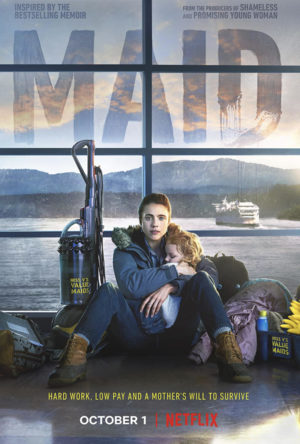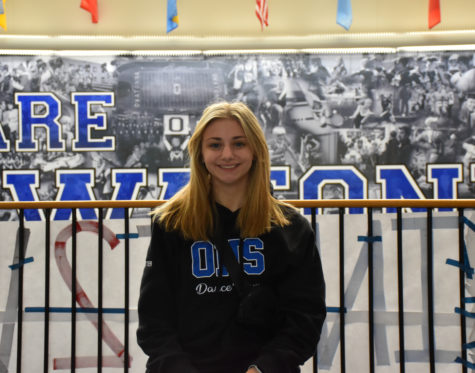Netflix show Maid highlights domestic abuse and poverty struggles
November 20, 2021

Source: Netflix (Press Release Photo)
Netflix released their show Maid on Oct. 21 inspired by the book Maid: Hard Work, Low Pay, and a Mother’s Will to Survive by Stephaine Land based on Land’s story of leaving her abusive husband. Maid shares the story of Alex Russell and her daughter Maddy on their journey after leaving her abusive father Sean Boyd. Along with showing the cycle of abuse, signs and patterns, a view into the government and poverty.
Throughout the show, Alex had to rebuild a life for herself and her daughter. Social services is an extremely difficult part of the government, trying to navigate it was close to impossible. Social services were designed to help families in need, but the system is so broken that it is hard to get the help they are supposed to provide. Ms. Margo McKay, a counselor at OHS said, “It’s no wonder that some people just give up because it gets to be so difficult and you can’t get a job unless you have daycare and you can’t get daycare unless you have a job. There’s so many limitations about where you can live and the other thing that I thought this pointed out well too is transitional housing can be very scary for people that have children with them.”
Alex struggled to find a job because she needed daycare for Maddy but needed a job for daycare. Transitional housing is where some released criminals stay during parole, Alex did not want to stay there because of Maddy. Social services are so used to drug addicts or criminals that when someone like Alex comes in truly needing help they are unsure of how to react. Ms. McKay said, “People who are within the system and need money to live, to eat, to function like she did often make different choices. They break the law, and they might, if they’re very desperate and if they’re addicted, do things like that. We feel like it’s such an important series for everyone to watch.”
The abusiveness can stem from a big life event. Boyd’s behavior did not change until Alex found out she was pregnant with Maddy, ever since then she has been afraid of him. Alex did not even acknowledge the abuse until almost halfway through the show. Alex had always just thought Boyd was taking charge to take care of their family as the man of the home. Mayo Clinic said, “Abusive relationships always involve an imbalance of power and control. An abuser uses intimidating, hurtful words and behaviors to control his or her partner.” Boyd used his power over Alex to control her. Ms. McKay said, “The games that [Boyd] played with her emotionally to keep her and get her to stay and the control he used was part of his tactics to get her to do what he wanted her to do.” Boyd had taken control over Alex’s finances and transportation as one of his ways to trap her.
Alex’s family and friends stayed on Boyd’s side and chose not to get involved because they did not understand what was going on between them and the abuse Alex was enduring. Alex’s mother Paula is severely bipolar and mentally unwell. She went through domestic violence herself with Alex’s father Hank, resulting in Paula taking off with Alex as a toddler in the middle of the night, just like Alex did with Maddy, showing a pattern of domestic abuse victims between Paula and Alex. Ms. Sara Craig, another counselor at OHS said, “It’s brought up several times throughout the series that his mom was also an addict and was abusive towards him. I also really admired Alex for just the way that she stood up to her dad, like once she was having those flashbacks, showing what had happened when she was a child. She was like, ‘no, we’re not doing this.’” Boyd grew up with a mother who is not only a drug addict herself but got her son addicted as well around the age of nine.
The cycle of abuse is sadly a reality for a lot of people. Including students here at OHS. Students in class or in the hallways may be going through some type of abuse at home. Children who watch their parents go through abuse are more likely to end up in abusive relationships themselves. Domestic Abuse Shelter Inc. said, “Seventy-three percent of male abusers were abused as children.” One person Alex met was the DBQ shelter owner Denise who also went through domestic abuse, she shared with Alex that it takes on average seven times to leave an abusive relationship. It took Denise five tries before she left for good.
Abusers in relationships are very good at degrading you into thinking no one else cares or loves which drives the victim away from their friends and family. In regards to the show Ms. McKay said, “That people who are often in relationships where they think they can change the person or I’m just gonna hang in there. With abuse you’re convinced that nobody else will love you and that’s the best that you’re going to do. So they ask themselves, is it better to be with somebody who’s kind of awful to me, or is it better to be alone?”
Overall, this show is not easy to watch realizing that this and much worse is reality for a lot of people. The impact this show left on its viewers was a very powerful one and an eye opener. Alex’s complications continue after leaving for good the second time, lucky she found a support system of people she thought she would never have. Alex showed extreme resilience throughout the show as she never gave up.


